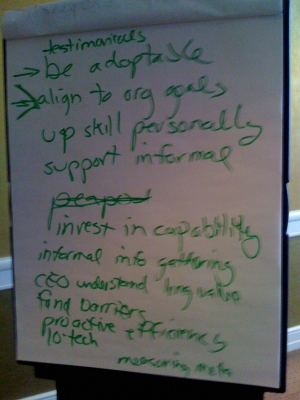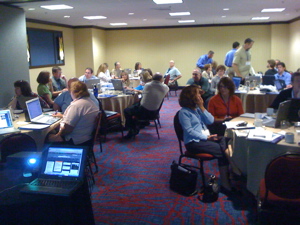Having just come back from DevLearn (which rocked; my hearty thanks to all participants and organizers), and now engaged in the Corporate Learning Trends conference (free, online), I’m seeing some repeated themes, and interests. It’s a busy time, since we‘re deeply engaged in the latter, but some messages are coming through so powerfully that I’ve got to reflect on them.
 In this time of economic uncertainty or outright fear, one of the resonant themes is ‘how to cope’. Marcia Conner, one of our forward thinkers, is going to be talking about the topic of coping tomorrow at 10 AM PT, and I’m looking forward to it!I believe that’s important at the societal level as well. We need to invest in our capabilities when things are down so we’re poised to capitalize on the upswing. Jay invited me to share his breakfast byte at DevLearn on the topic.
In this time of economic uncertainty or outright fear, one of the resonant themes is ‘how to cope’. Marcia Conner, one of our forward thinkers, is going to be talking about the topic of coping tomorrow at 10 AM PT, and I’m looking forward to it!I believe that’s important at the societal level as well. We need to invest in our capabilities when things are down so we’re poised to capitalize on the upswing. Jay invited me to share his breakfast byte at DevLearn on the topic.
We brainstormed with the attendees, and came up with some interesting points. At the personal level was to be nimble, strategic, and develop yourself. Tony Karrer talked today about investing in knowing how to use the tools effectively, building upon all the tools that Robin Good and Jane Hart had described yesterday (simply amazing tools).
The organization level of that is to develop infrastructure and capability. Dave Pollard today talked about moving from Knowledge Management 1.0 to 2.0, empowering people to self-help. What can you do to foster creativity and innovation on a shoestring when you can’t cope with full-fledged initiatives? Can you get a small social networking tool initiative going that can help people help each other?
A couple of recurrent themes were selling this to management, and managing the proliferation of tools. For the former, I reckon it’s about helping more than just novices, but providing self-help. It depends, of course, on what your needs are and consequently what you choose to implement, but the outcomes can clearly be linked to organizational goals and problems, like reducing time-to-information, increasing productive collaboration, and sharing. For the problem of tracking the tools, I think the key are the needed affordances. I’ve been focused on finding the affordances of the tools, but it’s another thing to think about the affordances an organization needs and map tools into them. Briefly, it’s about collaborative representations (prose, graphics), pointers to relevant topics, etc. More work to be done here, I reckon.
These topics are being discussed at the Corporate Learning Trends social site this week (and ongoing, hopefully) and you can join in.
Note that I think these are relevant societally as well. We developed some serious infrastructure through the WPA, and the Interstates, and it’s crumbling. At some point you need to build it back up (rebuild differently?) to meet the needs. That may increasingly be things like networks (and healthcare) as well as things like bridges. I think this is key to thinking about how to invest for the tough times; focus internally until times get good again and be poised to rebound. It’s like your body rebuilding while you’re asleep so you can restart the new day. Of course, you need to have hoarded the resources. May be a way short-term shareholder returns damage long-term survivability?
Here’s hoping the economic situation is short and mercifully gentle, and that you all survive and prosper!

 I hadn’t seen (and wish I had :). He’s citing another
I hadn’t seen (and wish I had :). He’s citing another 